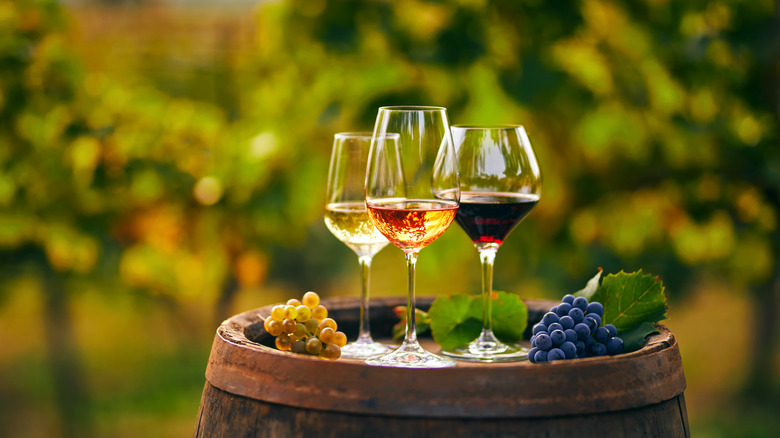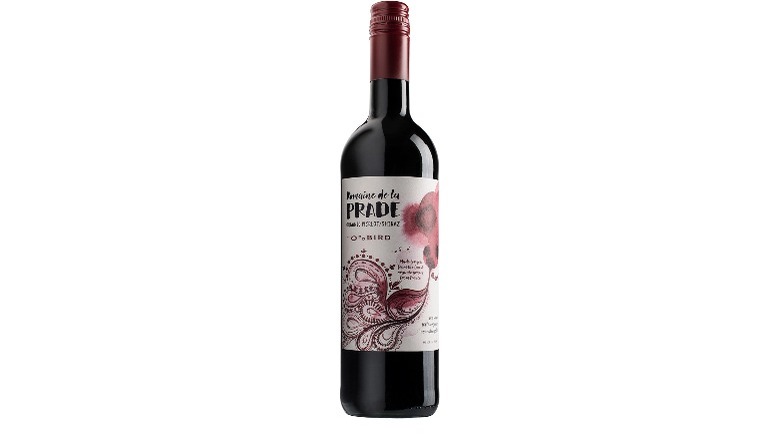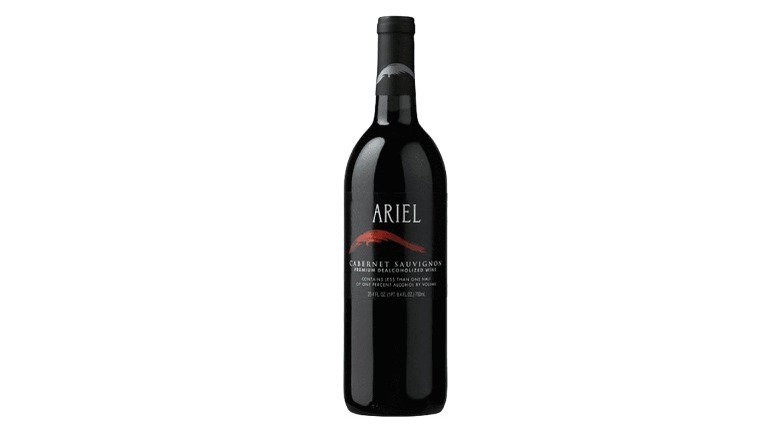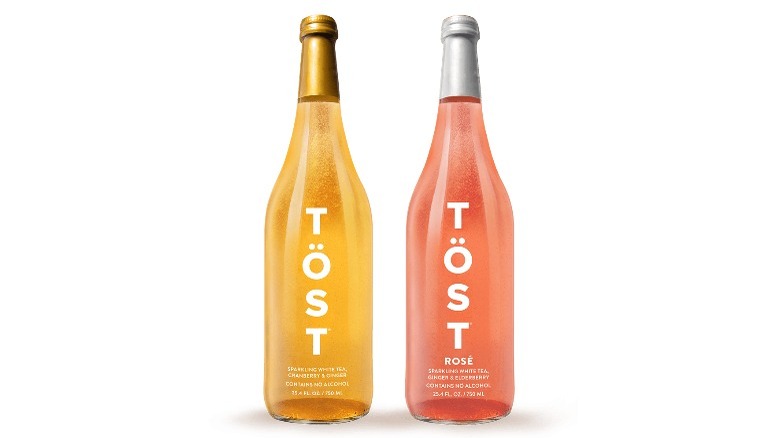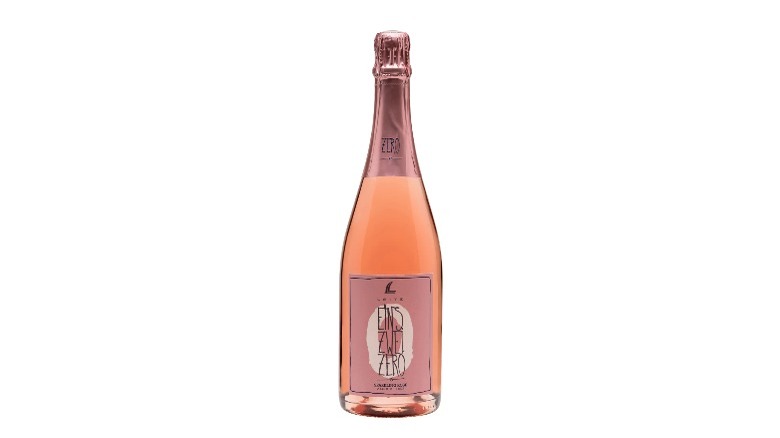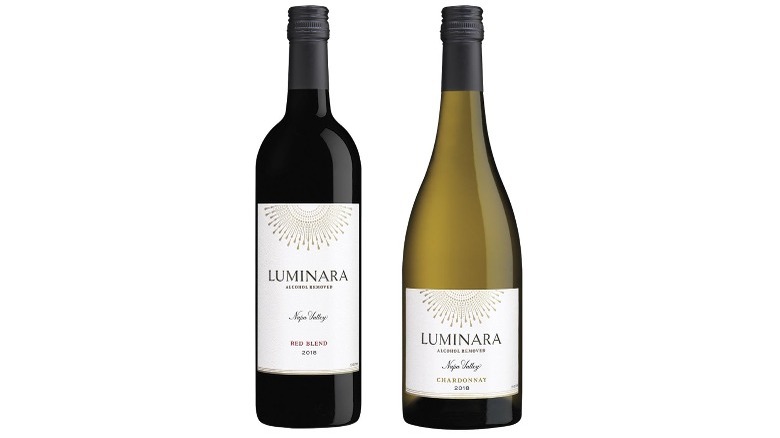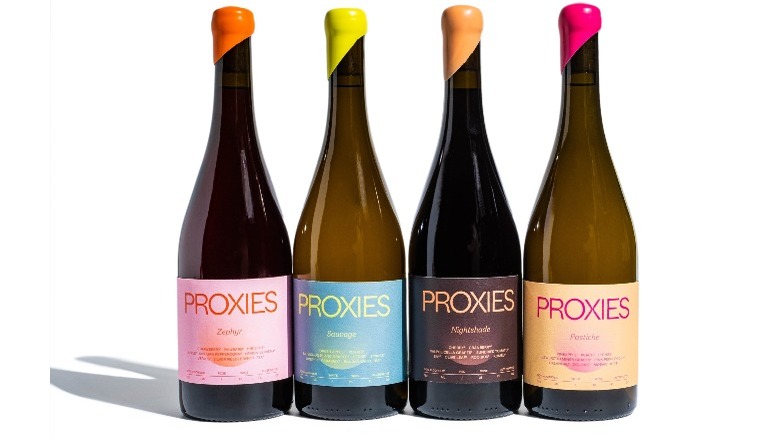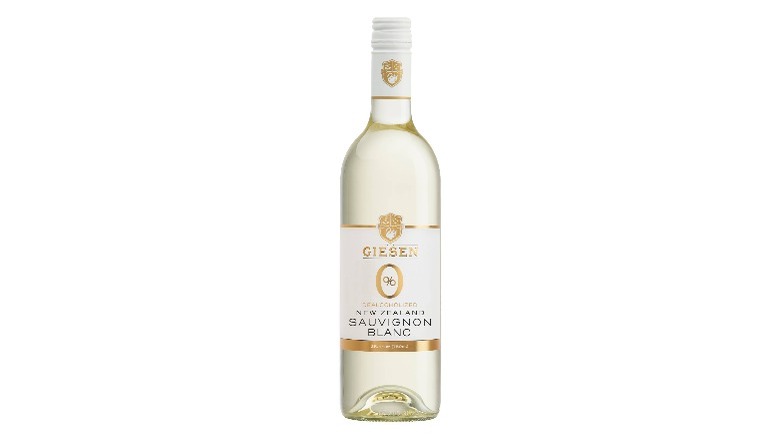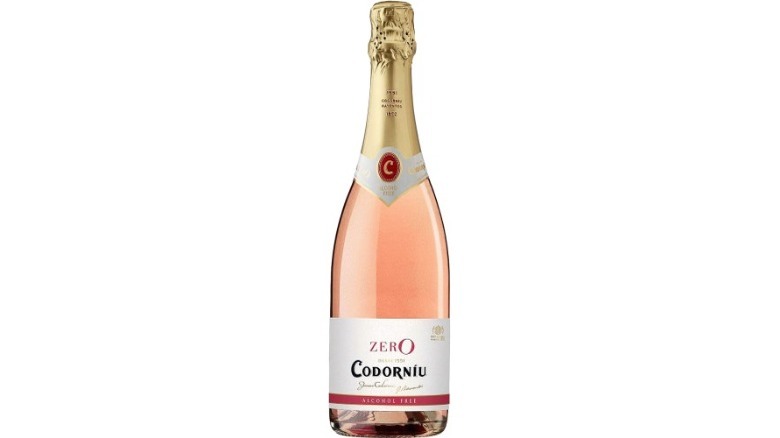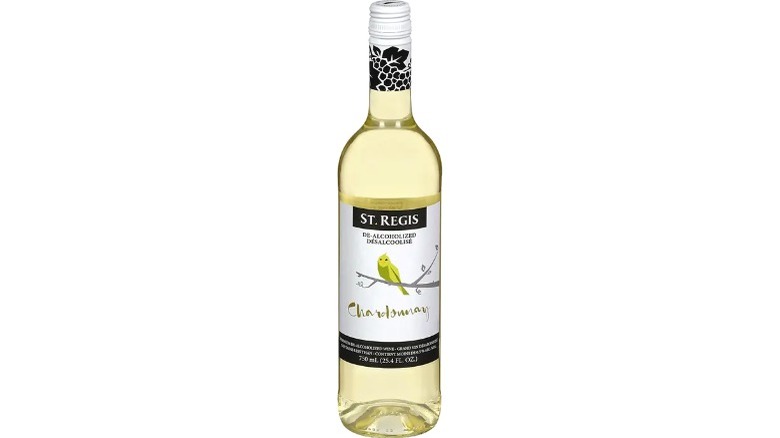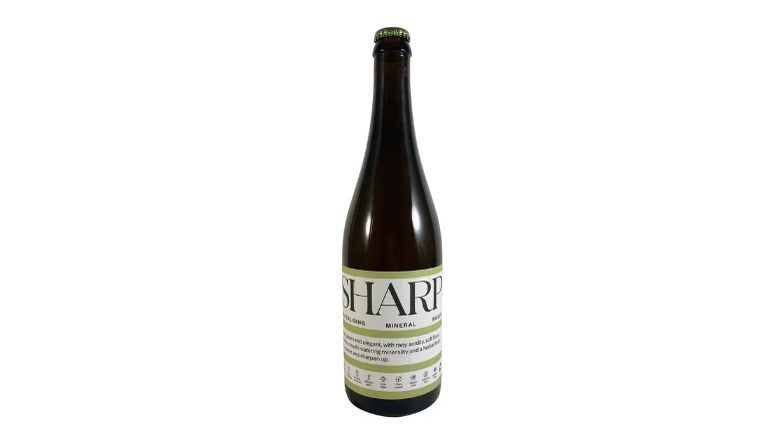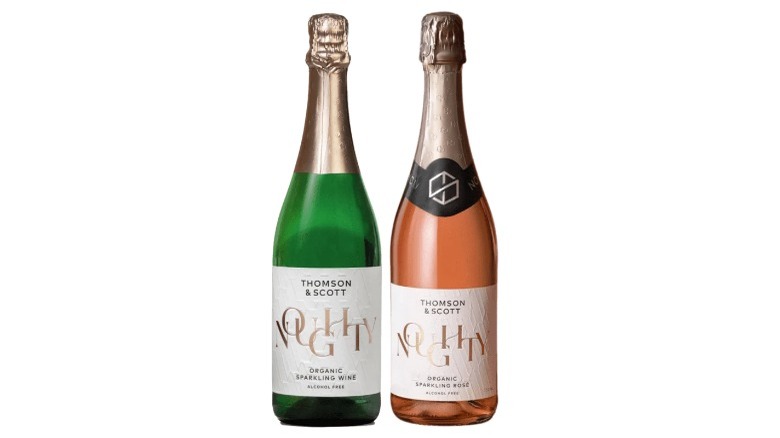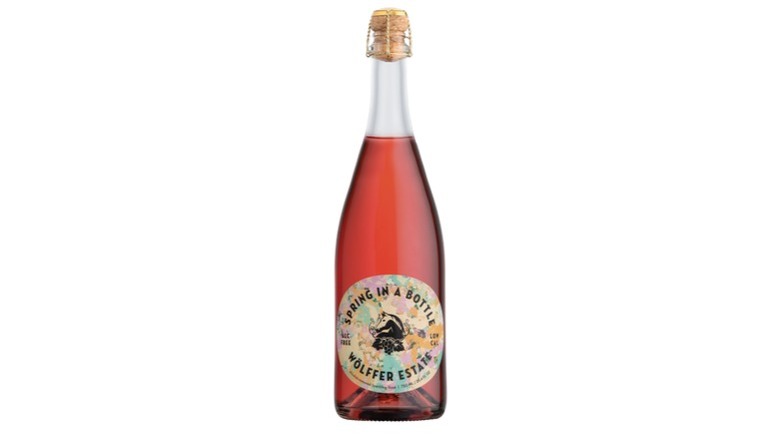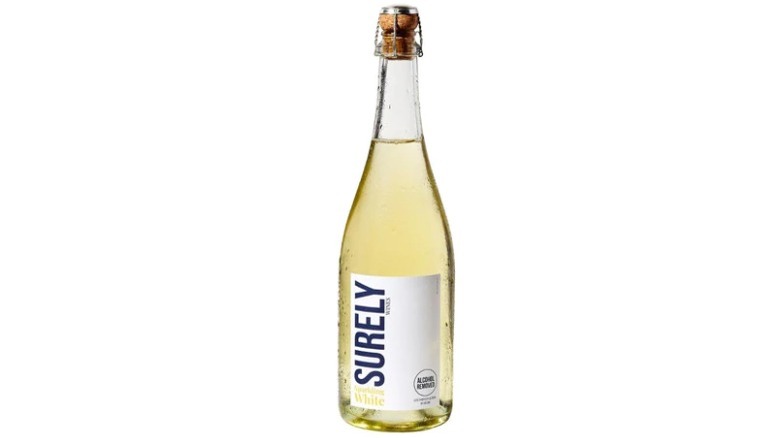13 Best Non-Alcoholic Wine Brands You Can Buy
A 2021 report from Wine Intelligence highlighted the fact that, while consumers are increasingly turning to non-alcoholic wine options, the market has yet to satisfy their needs. This issue becomes all the more pertinent as many foresee that the demand for non-alcoholic wines is here to stay. This is thought to be because non-alcoholic wines, defined by the Food and Drug Administration as those under 0.5% ABV, are especially popular with younger generations, including Millennials and Gen Z.
In recent years, the United States has seen the rise of various non-alcoholic beverages, including beers brewed by huge brands like Heineken, spirit alternatives produced by the likes of Pentire, and even faux aperitifs such as Figlia Fiore. While not exactly leading the charge, non-alcoholic wine has not been lagging too far behind. Forbes reports that from October 30, 2021, to October 30, 2022, the United States saw a 22% increase in non-alcoholic wine sales.
One of the reasons why this increase remained modest is because historically, the removal of alcohol from wine has caused some issues with the final product, giving dealcoholized wines a bad reputation, per The New York Times. Most notably, the wines lost their defining properties, including body, taste, and aroma. However, modern-day, non-alcoholic wine need not be confined to the limitations of the past and there are currently numerous producers, suppliers, and brands offering vintages of immense quality.
1. Oddbird
Having seen the detrimental impact alcohol can have on families and communities Moa Gürbüzer, an ex-social worker, launched Oddbird in an effort to prove that great-tasting wine need not be alcoholic. Key to this effort was developing a complex taste, achieved with minimal processing. This is a challenge that many non-alcoholic wine producers have faced, according to Wine Folly, with some feeling that there is little option but to use alcohol extraction methods that destroy the wine's delicate taste.
According to a press release by Oddbird, the company manages to avoid the destruction of the wine's flavor by removing the alcohol via a patented method. Although the details are unknown, it does involve vacuum distillation, a process that separates compounds based on differences in boiling points, per Busch.
Oddbird is clearly onto something, with the company's products tasting markedly superior to other non-alcoholic wines, as noted by Christine Parkinson, founder of Brimful Drinks, a no/low drinks consultancy. In an interview with Drinks Retailing, she said, "Until now, most non-alc wine was based on fairly entry-level alcoholic wines. The rise of specialist start-ups is changing that landscape, and better quality is the result. A good example is the Oddbird range. Their wines are drier and more expressive than most, and they are pushing boundaries. Their two reds (Oddbird Low Intervention Organic Red and Domaine de la Prade Organic) are good, and their sparkling rosé is currently the best available."
2. Ariel
As we have seen, removing alcohol from wines while maintaining their complex taste is one of the biggest challenges facing brands in the sector. Ariel manages to do a terrific job protecting the character and flavor of their two wines, a Chardonnay and a Cabernet Sauvignon. After tasting a number of non-alcoholic wines, Alison Napjus, senior editor and tasting director at Wine Spectator, marked the two Ariel wines as clearly the most flavorful.
Rather than using vacuum distillation, Ariel employs a reverse osmosis process to remove the alcohol. This works by passing the liquid through a very fine filter, which separates the wine from the vast majority of alcohol and water. The water can then be added back to the wine concentrate, creating the dealcoholized wine.
Ariel is part of the renowned winemaking estate, J. Lohr Vineyards & Wines. Voted one of the top 100 wineries in the world by Wine & Spirits magazine, J. Lohr is an eminent winery with access to some of the best vineyards in California. It is from these vineyards that the grapes used to make Ariel are harvested. With such wonderful natural ingredients and world-class expertise on hand, it is not difficult to see why Ariel is one of the best low alcoholic wines available for purchase.
3. Töst
There are two main approaches when it comes to producing non-alcoholic wine. The more traditional way is to make a regular-strength wine and then extract the alcohol. The alternative is to create a beverage that is inspired by wine, one which — while not using traditional ingredients or production methods, nor directly imitating the taste — still fulfills the role of wine. Töst falls firmly into the latter category with the flagship product being made from white cranberry, ginger, and white tea. As a result, it is naturally alcohol-free and needn't undergo complex and potentially detrimental alcohol extraction processes.
The one issue with creating a wine-inspired beverage is convincing people that it is a suitable, adult replacement for wine and not just a glorified soda. Of course, one of the main ways of tackling this misconception is through design and marketing. With its sleek bottle and minimalist label, it is clear that Töst has been made to suit the most formal of celebrations. The appearance is mirrored by its mature taste, as explained by company CEO Brooks Addington. "Sophisticated, refreshing, meaningful, dry, and crisp — that's what we're going after," he said. "It has a ginger taste to it, but it has various citrus notes to it, also, to open it up. People are thrilled to have a non-alcoholic option, and our product offers a sophistication."
4. Leitz
As reported by Eric Asimov, wine critic at The New York Times, Letiz is a well-established wine producer in Germany that specializes in the production of riesling, a flowery, dry, white wine. Leitz uses the exact same wine for its alcoholic and non-alcoholic options and, as owner Johannes Leitz suggests, the high quality of the starting product is what sets the brand's non-alcoholic offerings, like Eins Zwei Zero apart from other competitors on the market.
Eins Zwei Zero is packed full of traditional riesling flavors, including citrus, rhubarb, and apples, all while offering much fewer calories and sugar than a regular alcoholic wine. Leitz's products are even sold in single-serve cans, which has attracted many consumers to the brand, such as PR founder Esha Dev. "I'm a fan of Leitz Eins Zwei Zero's Sparkling Rosé, made from 100% pinot noir grapes," she said in an interview with VinePair. "Unlike some other NA sparkling wines out there, it's not too sweet. It has a crisp, acidic finish instead of an onslaught of sugar. It comes bottled and canned, but I like getting it in cans so I can get it nice and chilled. Also perfect for taking on-the-go and enjoying with a charcuterie or tinned fish picnic spread."
5. Luminara
Luminara's two wines, a red blend and a chardonnay, consistently surprise consumers with just how close they are in taste, texture, and scent to regular, alcoholic wines. Of the two, the red blend seems to be slightly superior. PureWow gave this wine an impressive score of 97/100 and noted the classic smokey and spiced flavors that appeared on the palate. Luminara's chardonnay doesn't fall far behind and scored 93/100 Tasters note it was hard to tell the difference between this glass of chardonnay and one with alcohol.
While some may prefer the red blend, Luminara wines have a complexity of flavor not often seen in non-alcoholic wines. This is a product of the wine's aging process, which takes place in oak barrels.
The wines are produced in Napa Valley, one of the best wine-producing regions in the world. Both varieties retail around the $20 mark, before taxes and shipping, making it markedly cheaper than most Napa Valley wines (via Better Rhodes), as if you needed another reason to try them.
6. Proxies
With their brightly colored wax seals and enticingly named products, Wine Proxies' bottles are instantly eye-catching. Fortunately, the liquid inside the bottle is equally appealing, with multiple ingredients being layered to form a wine-inspired beverage. Tea, grapes, verjus, herbs, and spices all play a role across Proxies' wide range of flavored drinks.
The approach of building a wine-inspired beverage rather than a dealcoholized wine means that creation –not imitation — is at the forefront of what Proxies does. According to the head of Proxies, Charlie Friedmann, "[the approach was] not necessarily to recreate wine flavors, but to recreate the characteristics of wine that make it a good food pairing, that make it an interesting thing to drink with your meal. And that's having body, texture, balance, a tannin structure, things that are pretty rare in non-alcoholic drinks, especially the textural element, and we can layer all kinds of flavor on that framework. That's what makes it 'Proxies'."
Allowing this creativity has ensured that the products produced by Proxies are of an exceptional and unique style. For the curious drinker looking for an exciting beverage to take the place of alcohol, grabbing a bottle of Proxies is a fantastic place to start.
7. Giesen
It is true that non-alcoholic wine sales have lagged behind those of other non-alcoholic beverages, such as beer and spirits. Yet, the market for non-alcoholic wine is still growing. No brand typifies this better than the New Zealand-based Giesen which, as Forbes reports, has seen a huge 454% increase in shipments to the United States.
Explaining this massive surge in demand was Giesen winemaker, Duncan Shouler. "Most of our consumers are habitual wine drinkers, and they want the experiential aspect of drinking wine while also prioritizing their own wellness choices," he said in an interview with Bar & Restaurant. "With alcohol-removed wine, many people have come to realize that an appealing option exists that includes both of these elements. This has driven a larger demand for premium, high-quality, dealcoholized wines that match the flavor and experience of drinking full-strength wines."
Giesen produces a number of wines, many of them full strength, and it is this robust knowledge and industrial expertise concerning all things wine that has enabled the brand to create such high-quality dealcoholized alternatives. Despite creating a range of dealcoholized wines, sauvignon blanc – New Zealand's most famous grape variety – is always going to be the yardstick by which any wine producer from the country is measured. Unsurprisingly, Giesen's zero alcohol sauvignon blanc passes the test with flying colors, demonstrating all the characteristics you would expect, including flavors of ripe fruits, a hit of tartness, and a crisp finish.
8. Codorníu
As the oldest and second-largest cava producer in Spain, there is perhaps no better producer of sparkling wine than Codorníu. The regular versions of cava produced by Codorníu are frequently lauded by publications such as the Independent, thanks to their fruity taste and luxurious finish. Achieving a product of similar quality without alcohol, in a beverage as complex as cava, is no easy feat. However, Codorníu has managed it thanks to the use of a modern alcohol extraction technique.
To remove the alcohol without damaging the delicate flavor and luxurious finish, Codorníu uses a method called the spinning cone, per SevenFifty Daily. This technique uses both heat and centrifugal force to strip the liquid of alcohol and other elements that are not required in the cava. Director of oenological projects at Codorníu, Mark Naim, prefers this method over both reverse osmosis and vacuum distillation. However, Naim does concede that the alcohol must be replaced with something. At Codorníu it's mainly grape juice and tannins, which lend a bit of extra body to this astoundingly good cava.
9. St Regis
St Regis markets itself as a wine brand that caters to what it calls the "sober curious," those who sit at neither end of the alcohol-drinking extremes. The array of wines with which they seek to entice the sober curious is impressive, ranging from chardonnay to cabernet sauvignon. As with several other brands on this list, St Regis' wines begin with high-quality grapes from some of the world's best vineyards. They are fermented and aged using tried and tested, then vacuum distillation is employed to remove the alcohol.
While St Regis' products are made in the traditional manner, the brand stands out by promoting them not solely as a wine, but as an important addition to any mocktail cabinet. Exciting recipes for beverages, such as the Noma Sour, make unique use of St Regis' products, potentially opening up a whole new dimension for even experienced, non-alcoholic wine drinkers.
10. Blurred Vines
Three Spirit is an award-winning alcohol-free spirits company that has gained acclaim for its bold use of flavors, invigorating ingredients, and pioneering processes. Blurred Vines, the company's alcohol-free wine brand, was a natural progression for Three Spirit and was met with instant success. At the International Wine and Spirit Competition, the two wines, Spark — a red fruit-forward, fizzy beverage — and Sharp — a white wine alternative — both medaled. Spark received a silver with a score of 94/100 while Sharp secured a gold with an incredible score of 98/100.
Like Proxies and Töst, Blurred Vines creates wine-inspired beverages without chaining themselves to the idea of imitation. This has allowed the company to freely experiment with a range of ingredients, processes, and techniques. The result is two products that play the role of wine, but with their own unique twist, as co-founder Dash Lilley explained, "Making liquids that can deliver in a wine consumption moment means creating products that fit different occasions. Big bubbles and bright flavors for cork popping and celebrations. Sharp, racy acidity and fresh, green citrus fruits for the ultimate palate cleanser."
11. Noughty
Having your wines praised by noted food writer and The New York Times columnist, Florence Fabricant is no mean feat. Yet, after launching Noughty in 2019, this kind of glowing praise is perhaps becoming routine for Amanda Thomson, founder and CEO of Noughty, currently one of the world's hottest, non-alcoholic wine brands.
Speaking to Smithsonian Magazine, Thomson stated how Noughty's newest offering, a dealcoholized syrah, regains its character post-alcohol extraction. "The less than 0.5 percent alcohol [in our dealcoholized wine] is from the flavor we build back into the wine," she says. "We use different tannins, mannoproteins and very small doses of sugar to rebuild the body and structure of the wine to our exacting taste." Aside from this great taste, Noughty is also an inclusive wine brand, with all their products being halal, vegan, and low in sugar.
The high quality of all three Noughty wines — a syrah, a sparkling chardonnay, and a sparkling rosé — should come as little surprise; Thomson has a string of accolades attached to her name, including a diploma in wine from Le Cordon Bleu and being one of Business Insider's 100 coolest people in the food industry in 2019.
12. Wölffer Estate
While some beverages on this list are not styled in the vein of traditional wine, Wölffer Estate's Spring in a Bottle — made from a blend of organically grown pinot noir, pinot Meunier, dornfelder, and Saint Laurent — most definitely is. As noted by The New York Times, so well-executed is this wine that the absence of alcohol might not be noticed by even seasoned oenophiles. This will come as no surprise to those familiar with Wölffer Estate, it being the home of iconic 21st-century wines such as Summer in a Bottle, a rosé so good that it made national headlines when stocks fell low one summer, per The Washington Post.
It is true that Wölffer Estate's portfolio of non-alcoholic wine is limited, however other offerings provide just as much complexity and nuance as the aforementioned Spring in a Bottle. The estate's petite rosé verjus is one such example, promising a vibrant, juicy, and refreshing tipple, complete with a light effervescence and acidic bite. The only other non-alcoholic beverage currently made by the Wölffer Estate is verjus, a product that quickly became a favorite of chefs who wanted a quick and tasty spritz while working, as reported by The Zero Proof.
13. Surely
It was the marriage of wine and wellness that was the inspiration behind Surely, as founder and CEO Ryan Hanson explained to Forbes. "We started Surely with this mindset of let's build something that's really high quality and [is] also a really clean label," he said. "So kind of feeling like you're able to have something that's sophisticated and elevated, just like all the other craft alcoholic beverages, but you don't have to make that health trade-off as a result. And not only not alcoholic, but also not a bunch of sugar, not a bunch of carbs — like something that really feels like you can maintain whatever your lifestyle goals are while enjoying being part of a moment with everybody else."
Since launching, Surely has gone on to meet this remit, with its high-quality wines — including sauvigon blancs, pinot noirs, and sparkling rosés — becoming hugely popular, especially in the months of January and October. Thanks to the sourcing of excellent grapes, a patient and diligent winemaking process, and the use of spinning cone column technology (via Surely), all products produced by the brand are uncannily close in both taste and texture to the wine industry's leading alcoholic options.
